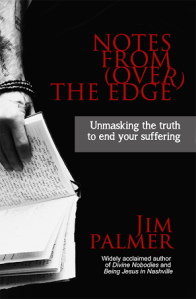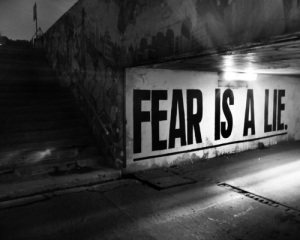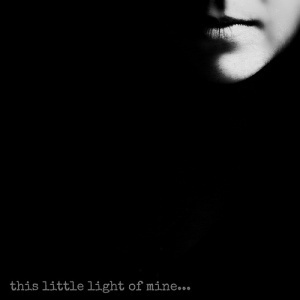Jim Palmer's Blog, page 41
February 1, 2014
Giving up Christianity to know Christ?
“The fact that Jesus was turned into a religion was a grave error, and is often a barrier to the truth. It is odd but true that it is sometimes necessary to shed Christianity in order to fully know Christ.”
- Jim Palmer


Ignorance is NOT bliss
The first thing we learn about ourselves is that we were born out of the image, likeness, and being of God. In other words, our inner being is an extension of God – an extension of love, wholeness, freedom, peace, well-being, permanence, eternality, and completion. That inner being was born into a human mind, body, and personality. We chose to be here, we chose to take the human journey. We are expanding our inner being into the human dimension – that space and time reality that is characterized by change and impermanence. As human beings, we process the human dimension through our six senses – sight, hearing, touch, taste, smell, and the cognitive functioning of our mind. None of this is a problem, none of this is wrong. This is the way it is supposed to be. Our challenge is only that we have forgotten our true and original Self – that inner being that is the underlying, unchanging, and fundamental truth and reality of who we are. What that Self and inner being is and knows has become lost to us, and we make our way through the world in spiritual ignorance, which is the cause of our personal suffering and the suffering of this world. This human journey you are now living was meant to be the most exciting, fulfilling, amazing, spectacular, magnificent experience to be had. It is your inner being expanding itself through the human experience.


January 31, 2014
The Jesus before Christianity
“There was a historical Jesus before institutional Christianity. He was a much better Jesus than the one Christianity produced.
Jesus’s Hebrew or Aramaic name was “Yeshua.” The name “Jesus” originates from the Latin translation of the Greek name Iēsous, which comes from the Hebrew “Yeshua.” The English equivalent would be “Joshua.” So we could just as easily call Jesus “Joshua.” So let’s do that.
As far as titles go, which were common at that time, Joshua preferred to be called “son of man” or “son of Adam,” which has the same meaning. Jesus’ name could have easily been known to us as, Joshua ben Adam. But instead, “Christ” (from the Greek word, Christós, meaning “anointed”) is a translation of the Hebrew word Māšîaḥ, and became used as a messianic title for Jesus. The title was chosen by his followers and written into the New Testament.
God is spirit and takes on human expression in people. Joshua ben Adam taught that all people must relate to God in the spirit of his name. Think of this in light of the name Joshua ben Adam. The “son of man” or “son of Adam” means a human one in solidarity with all human ones. In other words, relating to God in the name of Joshua ben Adam means we come to God in solidarity with all humankind. This was the way of Joshua. He once taught that if one comes to worship God with a sacrifice but discovers he is in conflict with his neighbor that he should leave his sacrifice at the altar and go make amends. On another occasion, Joshua challenged people to extend this line of solidarity to include even one’s “enemy.” He equated service to God as caring for the lowliest and least among them, and spoke of loving God and loving others as two sides of the same coin.
One can only relate to God in the name and spirit of Joshua ben Adam because God is inseparable from people. There is no “us” and “them.” Joshua ben Adam would reject any religion that advocates hatred, violence, and division against others. He once said that merely speaking a term of diminishment against another is a violation of his way. It is not possible to hurt or neglect any human being without hurting or neglecting God.
Religion often implies that one meets God atop a mountain or in a temple. Still today, people often refer to a church building as the “House of God.” But Joshua ben Adam taught that we meet God in one another.”
- Jim Palmer, Notes from (Over) the Edge


Your birth certificate does not mark the beginning of you
You must awaken to the truth of who you are. Your understanding and view of yourself is too small, and will not allow you to experience the breadth and height and depth of why you are here. You were not born AS a body, you were born INTO a body. You have become attached to an idea of yourself as your body, mind, and personality. But you were born INTO your body, mind, and personality. Your birth certificate does not mark the beginning of you, it only identifies the human coordinates of when and how your human journey began. There is a you that has no beginning or end. This is your fundamental, underlying, and unchanging Self. If you walk into a movie theater, you have a sense of what happened before you walked in. There is a continuity to human life which our mind computes as past, present, and future – before the movie, during the movie, after the movie. When you were born, there was also a past but because your human mind had not yet developed and matured you don’t have memory of it. What it seems to you is that you began the day you were born. This is only because you don’t remember the reality and truth of who you are before the film of your human life began rolling. Now it is time for you to remember. You must remember in order to fully embrace why you are here. You cannot remember with your mind because your mind has little or no recognition of it. So you must stretch past your mind to a way of knowing deep within yourself. There is an intuitive and tacit understanding with which you can remember and know the you that has no beginning or end. You must remember.


Your birth certificate does mark the beginning of you
You must awaken to the truth of who you are. Your understanding and view of yourself is too small, and will not allow you to experience the breadth and height and depth of why you are here. You were not born AS a body, you were born INTO a body. You have become attached to an idea of yourself as your body, mind, and personality. But you were born INTO your body, mind, and personality. Your birth certificate does mark the beginning of you, it only identifies the human coordinates of when and how your human journey began. There is a you that has no beginning or end. This is your fundamental, underlying, and unchanging Self. If you walk into a movie theater, you have a sense of what happened before you walked in. There is a continuity to human life which our mind computes as past, present, and future – before the movie, during the movie, after the movie. When you were born, there was also a past but because your human mind had not yet developed and matured you don’t have memory of it. What it seems to you is that you began the day you were born. This is only because you don’t remember the reality and truth of who you are before the film of your human life began rolling. Now it is time for you to remember. You must remember in order to fully embrace why you are here. You cannot remember with your mind because your mind has little or no recognition of it. So you must stretch past your mind to a way of knowing deep within yourself. There is an intuitive and tacit understanding with which you can remember and know the you that has no beginning or end. You must remember.


January 30, 2014
What was the turning point on my spiritual journey?
“Someone recently asked me what the “turning point” was for me on my spiritual journey. It was truly grasping that God is Love. That was the first domino that fell that led to my liberation. Why? Because it removed the element of fear.
Fear will stop you on the path to Truth. This is why you must know that God is Love.
God is unconditional Love. I add the qualifier “unconditional” because religion has managed to successfully convince you of the absurd notion that there is something in the fine print that says there is actually a condition (or two or three depending on the religion or denomination) to God’s Love.
There isn’t!”
- Jim Palmer, Notes from (Over) the Edge


Do not concern yourself with labels.
Do not concern yourself with labels. People have angst about: What is “Christian”? Should I call myself “Christian”? Are you “Buddhist”? Is she a “Pantheist”? Is he a “Deist”? And on and on and on. Live your truth, be your truth. It would be better for someone to not know any label about you, and say: This person has great kindness and compassion. This person is good and trustworthy. This person has wisdom. This person is happy, at peace, and free.


January 29, 2014
20 Really Good Ideas Whatever You Happen to Believe About God
20 Really Good Ideas Whatever You Happen to Believe About God:
1. Do not do to others what you would not want them to do to you.
2. In all things, strive to cause no harm.
3. Affirm the inherent and equal worth of every human being.
4. Treat your fellow human beings and all living things with love, compassion, honesty, kindness, and respect.
5. Build a world that works for everyone. Do not overlook evil or shrink from administering justice, but always be ready to forgive wrongdoing freely admitted and honestly regretted.
6. Live life with a sense of joy and wonder.
7. Always seek to be learning something new.
8. Test all things; always check your ideas against the facts, and be ready to discard even a cherished belief if it does not conform to them.
9. Never seek to censor or cut yourself off from dissent; always respect the right of others to disagree with you. Agree to disagree.
10. Form independent opinions on the basis of your own reason and experience; do not allow yourself to be led blindly by others. Give people the freedom to also think for themselves, and form their own views.
11. Do not blindly follow authority. Question everything.
12. Refuse the “us” and “them” mentality,” and consider yourself and all others as members of one human family.
13. Whatever your religious, spiritual, or philosophical beliefs, views, or tradition, honor above all else the underlying and unifying values of love, compassion, and respect.
14. Affirm the goodness you see and experience in others.
15. Love yourself. Have compassion, and be kind to yourself. Find peace within yourself. Give yourself permission to be a fully and authentically self-expressed person, and an expression of that love, compassion, and peace.
16. Be mindful especially of those who are often overlooked, forgotten, and those who suffer in silence or languish in need. Be an advocate and friend to these.
17. Be aware of the world’s children, and the difficulties and challenges of making their way in this life. Whenever it is in your power, do what will encourage, empower, and protect a child, and let them know that they are beautiful and loved.
18. Do not become forgetful of those who are near their journey’s end. Honor your elders, love them, be with them, learn from them, care for them, and express gratitude for the lives they have lived.
19. Follow, honor, express, and share what you most deeply believe, but never allow this to become a source of pride, hatred, division, or the diminishment of other human beings.
20. Don’t just exist, live and live fully! Receive each day as a gift, be present in each moment.
- Jim Palmer
(Photo by Darla Winn)


January 28, 2014
When language is a box
In addition to writing and my spiritual direction practice, I am an adjunct professor in the areas of religion, ethics, world cultures, and linguistics. Teaching my linguistic class this morning. The question for the day is: Does language determine how we see and understand the world? If so, is there a way that language can be a prison? In what ways do people see and understand the world differently because of the differences in their language? How can we live mindfully with respect to the power, influence, and limitations of our language? How can we transcend or not be boxed in by language?


Is worship what Jesus wants?
“The time is coming soon when I will be gone.”
“You cannot go, Jesus. How shall we carry on without you?”
“You must find me in yourself.”
“How is that possible? Will you step inside of us, and live your life there?”
“The life you have seen in, as, and through me is also your life. We share in the one life together. If I stay much longer you will become convinced that this is about me, and miss the life I am referring to, which is also in, as, and through you.”
“But should we not elevate you to the highest place among men, worship you, and create a new religion in your name.”
“Let this one life be your “religion.” Listen to its promptings. Be and do as you are led.”
- Jesus speaks to his disciples, Religion-Free Bible












